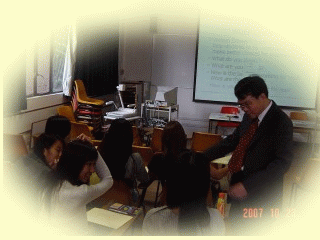Home > Contents > Session Three
Session Three: Teachers as facilitators
What are the important qualities of a facilitative teacher? - The context of adolescent development: Teacher-student relationship
- Building an effective teacher-student relationship
- Enhancing students' problem solving skills
- A facilitative teacher
- Humanistic teaching
![]()
At end of the session, the participants will be able to: |
Task: Using Reflecting Skills (see above)
Example: (The task below is just selected from those tasks assigned in the Learning Guides.) Study the following conversation between a class-teacher (Mr. Jones) and his student (June).
Mr. Jones: Hello, June, you wanted to see me about something. How can I help you?
June: I want to drop one of my subjects¡KPhysics.
Mr. Jones: You've decided to drop Physics? You do that with Mr. Wong.
June: I know it¡¦s not your subject, but I wanted to have a chat with you about it first.
He'll go mad when I tell him, but I¡¦m so far behind with my assignments, I feel I'll
never catch up. We've got another one to do today and I've not done the last two yet. |
References (see

Further readings and resources:
| 1. | Personal Qualities and Positive Beliefs of Facilitative Teachers |
- Patterson, C. H. & Purkey, W. W. (1993). The preparation of humanistic teachers for schools of the next century. Journal of Humanistic Education and Development, 31, 147-155. |
|
| 2. | Student-Teacher Relationship and Communication/ Helping Skills |
- Bor, R., Ebner-Landy, J. Gill, S., & Brace, C. (2002). Counselling in schools. London: Sage. (Chapter 5: Overview of |
|
| 3. | Humanistic Education |
- Aloni, N. (2002). Enhancing humanity: the philosophical foundations of humanistic education. Boston: Kluwer Academic Publishers. |
|
| 4. | Useful websites: |
- Facilitative Teacher/ Good Teacher http://scied.gsu.edu/Hassard/mos/10.2.html http://www.highlandschools-virtualib.org.uk/ltt/inclusive_enjoyable/teacher.htm |
|
| 5. | Video Recording and VCD (Available at HKU Main Library, AV 158.3 I61 c) |
- Knijff, A. (Producer). (1985). Introductory counseling skills [video recording]. Leicester, England: AVS, University of |